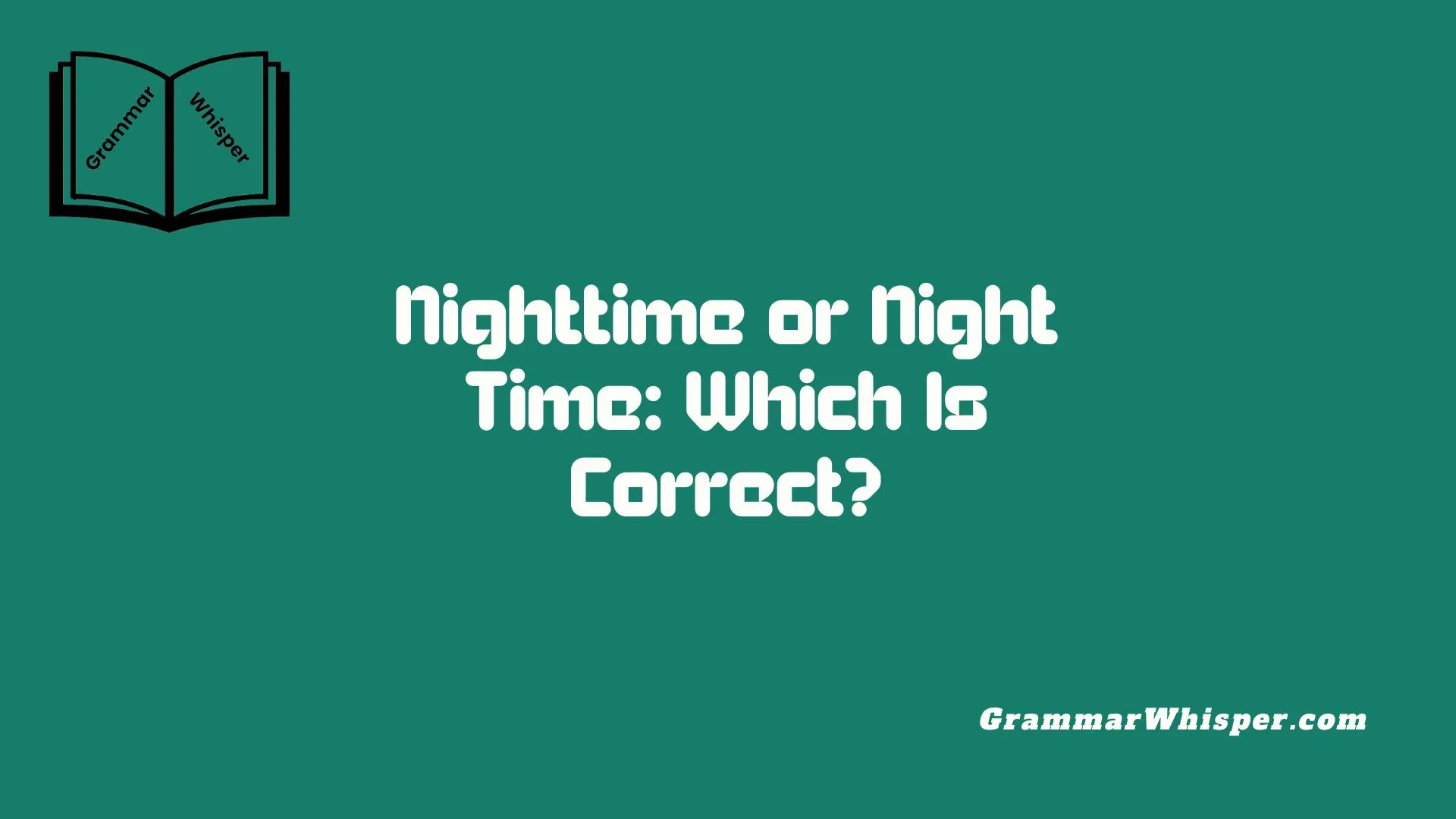The English language constantly shifts and adapts over time, so it’s no surprise that we often face spelling choices that feel confusing. One common difference is between Nighttime or Night Time. These two versions show up in writing, but only one is generally seen as correct in most formal or professional contexts. Over the years, modern usage has favored the single-word form, making “nighttime” the more appropriate, widely accepted version – especially in academic or everyday writing. As a copyeditor, I’ve noticed many writers, students, and editors pause over this subtle decision, but choosing the right form really can boost your credibility and improve your communication.
If you’re writing an essay or sending content to a client, understanding the grammar and regional preferences surrounding this term matters. “Nighttime” works as a noun, commonly found in professional and academic settings, while “night time” leans more toward casual use. The key lies in knowing what fits the context better. Good writing doesn’t just follow rules – it reflects clarity, intention, and awareness. Choosing the proper version can strengthen your message, and sometimes, it’s the smallest details that speak the loudest volumes.
Understanding the Core Question: One Word or Two?
At first glance, the only difference between nighttime and night time is a space. But that space changes more than formatting – it shifts meaning, grammatical function, and regional preferences.
- Nighttime is a compound noun, typically used as a standalone word that refers to the period of night.
- Night time, on the other hand, is a noun phrase, where “night” acts as an adjective modifying “time.”
So while both may refer to the same part of the day, their grammatical treatment and usage often differ.
Etymology and Historical Development
To understand the difference, we have to look back. The words “night” and “time” both come from Old English origins:
- Night (niht in Old English) traces back to Proto-Germanic *nahts, meaning the absence of light.
- Time (tīma in Old English) referred to a specific point or duration.
The earliest uses of “night time” in literature date back to the 14th century. Over time, as compound nouns became more common in English, “nighttime” emerged in written texts during the 18th and 19th centuries, especially in American literature. This shift reflects broader language evolution, where phrases were fused for efficiency and clarity.
Grammar Breakdown: Function and Form
Understanding the grammatical roles helps in choosing the correct form. Here’s a breakdown:
- Nighttime functions as a singular noun. Example: Nighttime comes earlier in winter.
- Night time is used more flexibly but often appears as a noun phrase. Example: The night time hours can be unpredictable.
Sometimes, “night time” can even appear as part of a prepositional phrase, especially in poetic or literary use.
Examples:
| Sentence | Form Used | Explanation |
| Nighttime is when the animals hunt. | Nighttime | Compound noun used for clarity |
| During the night time, strange things happen. | Night time | “Night” modifies “time” in a phrase |
Dictionaries Weigh In: What the Experts Say
Let’s look at what trusted dictionaries have to say:
- Merriam-Webster: Lists nighttime as the preferred spelling, defined as “the time of night.”
- Oxford English Dictionary (OED): Acknowledges both but favors nighttime as the modern form.
- Cambridge Dictionary: Also recognizes nighttime as standard, though it notes some regional variations.
Style Guides:
| Style Guide | Preferred Form | Notes |
| APA | Nighttime | Encourages concise compound forms |
| MLA | Nighttime | Standardized across disciplines |
| Chicago | Nighttime | Avoids unnecessary noun phrases |
Modern Usage Trends and Data
According to Google Ngram Viewer, “nighttime” has steadily increased in usage since the early 1900s and now dominates over “night time” in most published works.
Corpus linguistics data from COCA (Corpus of Contemporary American English) supports this trend:
- Nighttime appears 4x more frequently than night time in academic and media contexts.
In digital writing platforms like Grammarly or Microsoft Word, “nighttime” is often auto-suggested as the correct form. This reflects current norms and algorithmic preferences.
American English vs. British English
Regional variation plays a major role:
- American English overwhelmingly favors nighttime.
- British English sometimes uses “night time,” especially in poetic, descriptive, or literary contexts.
However, even in the UK, style manuals and academic usage lean toward the compound form.
Regional Preference Table:
| Region | Preferred Form | Usage Context |
| United States | Nighttime | Standard in education/media |
| UK/Commonwealth | Night time | Used more in informal/literary |
| Global English | Nighttime | Increasingly common and accepted |
Style and Tone Considerations
The choice between the two often depends on tone:
- Use nighttime when writing formal, academic, or business content.
- Use night time in lyrical, poetic, or narrative writing where rhythm matters.
For example:
She dreamed under the silver blanket of the night time sky.
vs.
Nighttime hours are peak periods for data backup in tech systems.
Usage in Literature, Media, and Pop Culture
The spelling choice can also reflect an author’s stylistic preference. You’ll find both versions across:
- Books: Nighttime is My Time by Mary Higgins Clark
- TV/Movies: Many scripts use “night time” to emphasize dramatic pacing
- Songs: Lyrics often prefer “night time” for rhythm, like in Night Time Is the Right Time by Ray Charles
Case Study: Children’s Literature
Books targeting early readers often prefer night time because the two-word form is easier to decode phonetically. However, this is a pedagogical choice rather than a grammar rule.
Examples and Use Cases
Let’s explore both forms side by side:
| Example Sentence | Correct Form | Why |
| I avoid driving during nighttime. | Nighttime | Concise and standard |
| The night time air was filled with music. | Night time | Literary tone |
| Nighttime routines help kids sleep better. | Nighttime | Functional use in parenting content |
| The sounds of the city at night time are unique. | Night time | Descriptive and stylistic |
When to Use Which: A Quick Reference Table
| Use Case | Preferred Form | Region | Notes |
| Blog or article title | Nighttime | US, Global | Concise and SEO friendly |
| Children’s book | Night time | UK/Commonwealth | Easier for early readers |
| Grammar explanation | Nighttime | US/Academic | Aligns with formal standards |
| Song lyric | Night time | Flexible | May favor two words for rhythm |
Conclusion
So, is it nighttime or night time? The answer depends on what you’re writing, who you’re writing for, and how formal or stylistic you want to be. When in doubt – check the dictionary, consider your audience, and stay consistent throughout your work. That one space can say a lot more than you think.
And in a world of evolving English, making the right choice reflects not only your language skills but your attention to detail, tone, and clarity – a must for any strong communicator.
FAQs
What is the correct spelling: nighttime or night time?
“Nighttime” is the correct and preferred spelling in American English. “Night time” is acceptable but less common and mostly used for stylistic or poetic effect.
Is nighttime one word or two?
“Nighttime” is one word. It functions as a compound noun. “Night time” is two separate words and functions as a noun phrase.
Why do some people still use “night time”?
Some writers choose “night time” for rhythm or poetic flow. It’s also used in certain British English contexts or for stylistic variation.
Does “nighttime” follow specific grammar rules?
Yes. “Nighttime” is a compound noun and should be used where a single noun is required. It’s treated like any other standard noun in sentence structure.
Which form is better for SEO: nighttime or night time?
“Nighttime” is generally better for SEO due to its higher search volume and standardized usage across digital platforms.











